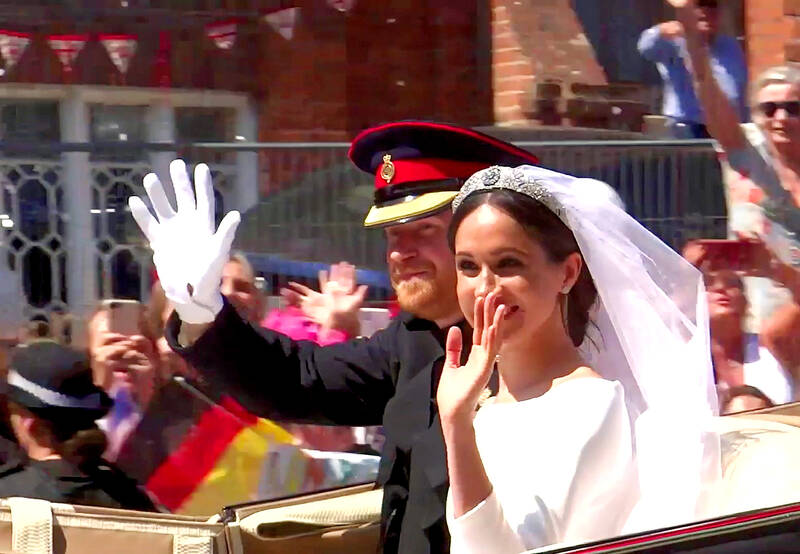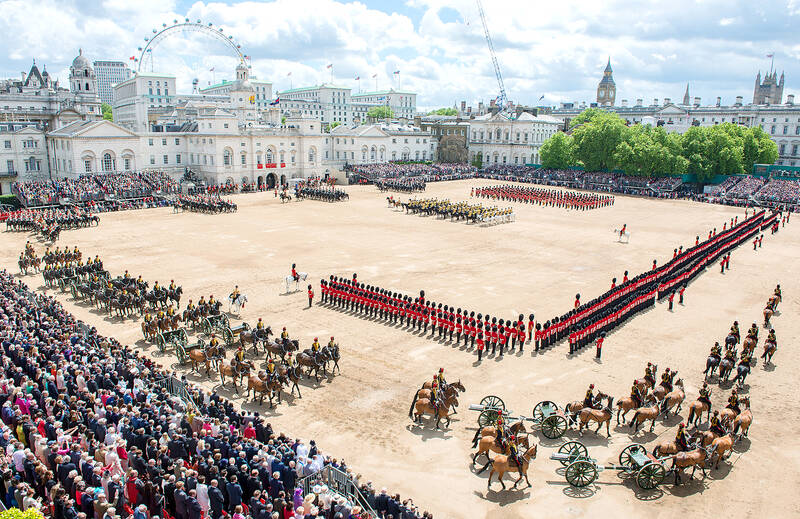The latest tome on the royals has dropped, though, according to initial reviews, with none of the explosive impact of Spare, the Duke of Sussex’s unsparing memoir.
Endgame — by the Sussexes’ journalist supporter-in-chief, Omid Scobie, the co-author of Finding Freedom, on their escape from “the firm” — examines a royal family “in crisis.”
It has been described as one-sided by monarchy-loving media outlets, with one unnamed royal source reportedly saying it is “depressingly poisonous.”

Scobie, 42, has stressed in pre-publication interviews that he has not interviewed Harry and Meghan for the book, nor is he Meghan’s friend. But he told the Times: “I have mutual friends with [Meghan], and that definitely helps with getting information and breaking details.”
Here are some of its claims.
HEIR APPARENT

Photo courtesy of Wikimedia Commons
The king is reportedly unnerved by the actions of Prince William. Scobie suggests William made attempts to upstage Charles, seeing him as a transitional king. Coverage of his father’s first trooping the color [King’s birthday parade] was wiped from front pages after William gave a rare interview to the Times, for example, the book claims.
William is cast as “hot-headed” and a “company man.” He did not consider Charles “competent enough” to adequately deal with the Duke of York situation, it claims. Charles’s reluctance is said to have “baffled” William, “who didn’t have much confidence in his father to do the right thing anyway.”
Buckingham Palace and Kensington Palace are reportedly “hives of competing agendas and different ideas about how to modernize.”
ANGRY KING
William’s unilateral decision to immediately distance himself from former lady-in-waiting Lady Susan Hussey after she asked Ngozi Fulani, a black charity leader, where she was “really” from, allegedly angered Buckingham Palace. A palace source is quoted saying it was “a rash … kneejerk response.”
The book claims Charles was disappointed by William’s failure to involve him in his big environmental initiative, the Earth Shot prize. It also claims Charles “derived some schadenfreude” from the Cambridges’ criticized tour of the Caribbean. But, Scobie suggests, Charles was “furious” when royal aides told journalists on the journey back that lessons had been learned and discussed a “blueprint” for William’s reign, seeing it as upstaging. The decision to evict Harry and Meghan from Frogmore Cottage is described as punishment.
Scobie reports that, in a phone call to Charles, Harry asked: “Don’t you want to see your grandchildren?”
BROTHERLY LOVE
William believes Harry has been “brainwashed” by an “army of therapists,” it is claimed. William also ignored texts from Harry on the day the late Queen died, meaning Harry had to charter a plane to get to Balmoral, it claims.
Scobie quotes Harry telling a friend: “I’m ready to move on past it. Whether we get an apology or accountability, who knows: who really cares at this point?”
The book also alleges that the Waleses allowed staff to circulate negative stories about the Sussexes.
THANKFUL QUEEN
Camilla is alleged to have quietly thanked the TV presenter Piers Morgan for defending “the firm” after he called Meghan “Princess Pinocchio.”
Camilla is also described by a former aide as rolling her eyes at “lefty nonsense” such as gender identity, unconscious bias and veganism.
LETTERS FROM MEGHAN
Harry was reportedly “gutted” when, after allegations of bullying staff were made against Meghan, the royal family stood by to watch the “dirty game play out.” Harry reportedly confronted his father and brother after Prince Philip’s funeral. Scobie writes that Charles replied: “You must understand, darling boy, the institution can’t just tell the media what to do.”
Charles and Meghan exchanged letters in the wake of her interview with Oprah Winfrey, it is alleged. The alleged letters are said to reveal the identity of two people the duchess claimed in the TV interview had aired “concerns” about the color of then-unborn Prince Archie’s skin.
QUEEN IN TRAINING
Kate is described as “jokingly shivering” when Meghan’s name is mentioned. She is accused of being “cold if she doesn’t like someone” and ignoring Meghan’s “cries for help.”
Scobie writes that Kate spent more time talking about Meghan than talking to her.
The future queen is described as an “inscrutable queen in training — an institutional dream come true.”
Buckingham Palace, Kensington Palace and the Duke and Duchess of Sussex’s representatives have been contacted for comment.

That US assistance was a model for Taiwan’s spectacular development success was early recognized by policymakers and analysts. In a report to the US Congress for the fiscal year 1962, former President John F. Kennedy noted Taiwan’s “rapid economic growth,” was “producing a substantial net gain in living.” Kennedy had a stake in Taiwan’s achievements and the US’ official development assistance (ODA) in general: In September 1961, his entreaty to make the 1960s a “decade of development,” and an accompanying proposal for dedicated legislation to this end, had been formalized by congressional passage of the Foreign Assistance Act. Two

March 31 to April 6 On May 13, 1950, National Taiwan University Hospital otolaryngologist Su You-peng (蘇友鵬) was summoned to the director’s office. He thought someone had complained about him practicing the violin at night, but when he entered the room, he knew something was terribly wrong. He saw several burly men who appeared to be government secret agents, and three other resident doctors: internist Hsu Chiang (許強), dermatologist Hu Pao-chen (胡寶珍) and ophthalmologist Hu Hsin-lin (胡鑫麟). They were handcuffed, herded onto two jeeps and taken to the Secrecy Bureau (保密局) for questioning. Su was still in his doctor’s robes at

Last week the Democratic Progressive Party (DPP) said that the budget cuts voted for by the China-aligned parties in the legislature, are intended to force the DPP to hike electricity rates. The public would then blame it for the rate hike. It’s fairly clear that the first part of that is correct. Slashing the budget of state-run Taiwan Power Co (Taipower, 台電) is a move intended to cause discontent with the DPP when electricity rates go up. Taipower’s debt, NT$422.9 billion (US$12.78 billion), is one of the numerous permanent crises created by the nation’s construction-industrial state and the developmentalist mentality it

Experts say that the devastating earthquake in Myanmar on Friday was likely the strongest to hit the country in decades, with disaster modeling suggesting thousands could be dead. Automatic assessments from the US Geological Survey (USGS) said the shallow 7.7-magnitude quake northwest of the central Myanmar city of Sagaing triggered a red alert for shaking-related fatalities and economic losses. “High casualties and extensive damage are probable and the disaster is likely widespread,” it said, locating the epicentre near the central Myanmar city of Mandalay, home to more than a million people. Myanmar’s ruling junta said on Saturday morning that the number killed had